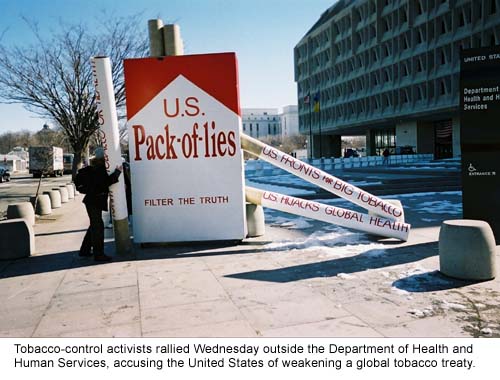 |
By Robert B. Bluey
CNSNews.com Staff Writer
February 13, 2003
Capitol Hill (CNSNews.com) - About a dozen tobacco-control activists rallied outside the Department of Health and Human Services Wednesday, accusing Secretary Tommy Thompson and President Bush of watering down a global treaty regulating tobacco.
The final negotiating session of the Framework Convention on Tobacco Control is set to begin next week in Geneva, which will lead to a vote in May. It also serves as the end to discussions that begin under the Clinton administration in October 1999.
More than 100 countries have participated in the convention, but anti-smoking groups lashed out in anger at the United States this week for what they perceive as Big Tobacco's influence in the deliberations.
In addition to Wednesday's rally, Sen. Richard Durbin (D-Ill.) and Rep. Henry Waxman (D-Calif.) sent a letter to Bush highlighting their concerns about the treaty and criticized Philip Morris' donations to the Republican Party.
The attacks were met with skepticism by the head of the U.S. delegation and tobacco giant Philip Morris (P.M.), whose parent Altria Group downplayed suggestions the company had influenced members of the administration.
"We do not know the Bush administration's positions," said Mark Berlind, Altria's legislative counsel. "We have had no behind-the-scenes contact with the administration. All of the positions of P.M. USA and P.M. International are publicly posted on a website. It's all completely transparent and out in the open what we want."
The tobacco industry has been able to get some of what it wants from the treaty, including a ban on marketing to children and new regulations for smuggling cigarettes, two items that Altria supports.
But other areas of concern remain, such as restrictions on trade. Berlind said any treaty that imposes trade barriers should be rejected. As it currently stands, the World Trade Organization has authority to step in during trade disputes, but under some proposals, the agency would be stripped of that power.
Anti-smoking groups would like to see those provisions adopted after the final negotiating session. Judith Wilkenfeld, director of international programs for the Campaign for Tobacco-Free Kids, said the initial goal of the convention was to limit tobacco use, something that is done by limiting trade.
She said the lack of such a provision in the treaty is a victory for Philip Morris, thanks in part to the Bush administration's unwillingness to push the issue.
Wilkenfeld also decried other "weak" areas of the treaty. She would like a complete ban on tobacco advertising, limits on "light" and "low tar" cigarettes and tougher language on secondhand smoke.
Some of those provisions would conflict with established law in the United States, including the First Amendment of the Constitution, said Kenneth Bernard, an assistant surgeon general and head of the U.S. delegation.
Bernard was particularly critical of a complete ban on tobacco advertising, which he said is unconstitutional and would preclude Bush from signing the treaty.
"We have federalism issues and First Amendment issues that keep us from signing onto certain high-minded initiatives," he said. "Some countries have banned tobacco smoking in public. You can ban all you want, but if you do nothing about it, it doesn't make any difference. It's one thing to sign onto a ban, it's another thing to enforce it."
Enforcing an advertising ban would be nearly impossible, he contended. In that regard, Bernard sees eye-to-eye with Altria, which opposes an advertising ban but would be in favor of certain restrictions, like those already in place in the United States.
Infact, a grassroots activist group, organized Wednesday's rally and released a report critical of the United States for its involvement in other treaties, including the Kyoto Protocol. Diana Silbergeld, who works for the group's Washington, D.C., office, said it would be unlikely for the United States to ratify the treaty, even if it reached an agreement favorable to Bush.
For that reason, Silbergeld said she would rather have the United States step aside in negotiations and let other countries craft a stronger treaty that advocates more tobacco control.
"The least the U.S. delegates can do is stop weakening the treaty for the rest of the world," she said. "This treaty should prioritize public health over trade."
Bernard, who is heading to Geneva later this week, said he does not understand why tobacco-control groups have attacked the United States.
"I'm trying to figure what we're doing that's way out of line," he said. "In this country, we have some of the most aggressive anti-smoking campaigns and health-oriented smoking policies in the world. We think a lot of people should be following our lead. Why they think we're trying to sabotage this is peculiar."